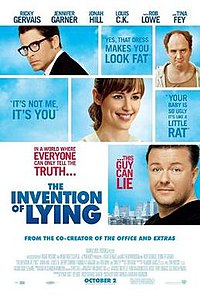
What would a world without lies be like? Obviously it'd be a lot more honest, but would it necessarily be better? In Ricky Gervais's brilliantly conceived but poorly executed The Invention of Lying, it's a world much like our own but lacking in any real adventure or risk. The point seeming to be that lies make the world go 'round, and that might very well be true, but I'd be lying if I said this movie lived up to it's amazing cast and thoughtful premise.
Gervais plays Mark, a schlub of a nobody if there ever was one, which is odd considering he's a screenwriter. In this world, however, being a screenwriter means you literally just recite history, because...well, not only can you not lie but embellishment is outlawed too. Mark's overshadowed at work by Brad(Rob Lowe, at his most devious), a much mor handsome, charismatic personality fortunate enough to have the most exciting centuries to write about. Mark is in love with the beautiful, leggy, and shallow Anna(Jennifer Garner). On their first date she informs him in no uncertain terms that he isn't attractive or successful enough for her. In fact, everyone including the waiter seems to enjoy telling him that.
See, this isn't just a world where lies are forbidden, but everyone seems to have no safety valve in their brains. They don't know when to hold back. Everyone is in overshare mode. Rather than just telling you that you're fat, they also need to throw in that you smell, too. The first 30 minutes, while funny, are little more than an exercise in insults. It grows thin pretty quickly, and it becomes apparent that a plot really needs to emerge at some point.
Down on his luck, about to be evicted from his apartment, Mark makes a trip to the bank to withdraw his final $300. Only this time, inexplicably, he asks for $800. When this succeeds, Mark realizes he's just discovered something game changing. Something fantastic. For a guy who now basically has the world in the palm of his hand, Mark doesn't really ever take advantage of it the way he could. For instance, he passes up on a chance to nail the beautiful Stephanie March(Law & Order: SVU) due to his own conscience. Rather than using it solely for personal gain, he does what he thinks people would want. When his mother, dying in a home, expresses her fear of the unknown, Mark tells her that the afterlife is the greatest and happiest place ever. It's obviously a lie, but it spreads like wildfire.
Mark is forced to explain his knowledge, and that's where the problems start. In a brilliantly insightful scene, Mark tells the world that there's a Man in the Sky who's responsible for all things. The good and the bad. This only leads to more trivial questions, although Mark, seeing the problems he's already created tries to get them to move on and focus on the big things. Hence, religion cannot exist without a bit of dishonesty thrown in.
Scenes like that show the true potential this film could've had if the plot were more focused. Somewhere around the halfway point, it feels like the core conceit is thrown by the wayside in favor of focusing on Mark's attempts to woo Anna. The two have become friends, but she won't have him because of the ugly kids they'll have. This storyline has it's moments, especially when Mark introduces the idea that there can be no sex before marriage or else you go to Hell, but it feels like something out of a bad CBS sitcom. Y'know, one of those sitcoms where the fat guy has an improbably hot wife? You know what I'm talking about. This movie is too smart for that kinda stuff. It deserves better.
Loads of guests join in on the fun, including Louis C.K. as Mark's dimwitted buddy; Philip Seymour Hoffman as an over eager bartender; and Jason Bateman as a doctor with the worst bedside manner since Caligula. Gervais is far better here than he was in Ghost Town just last year, but Garner is the stand out. She somehow manages to make Anna likable, even when she's being shredding poor Mark's emotions to shreds.
Gervais is a talented writer and comedian, that much is evident. But I think he lacks the confidence in his own material when trying to appeal to American audiences. He pulls back too much. The Invention of Lying should've been far more brazen than it is, and certainly should've been more funny. The commercials in this lie-free world are refreshingly honest. For instance, the Pepsi ads flatly state "For when there's no Coke". I'd be curious to see what the ads for this movie would be in that world. "For Well-Intentioned but Unfulfilling Humor". That sounds about right.
6/10










